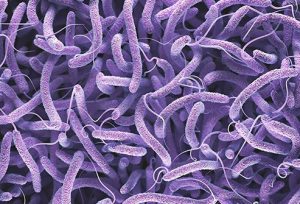Cholera : Causative Agent, Structure, Pathogenesis, Causes, Symptoms, Treatment And MCQs for NEET, GPAT, CSIR NET JRF
CAUSATIVE AGENT : Vibrio cholera
STRUCTURE : It is an comma – shaped, gram negative bacteria that have been the cause of seven great long lasting pandemics.

The above image is taken for education purpose only from medicinenet.com
PATHOGENESIS :-
The watery diarrhea which is the severe form of cholera is caused due to the secretion of 01 – serotype of V. cholera. Also, the secretion of non – 01 serotype causes diarrhea which is caused by eating contaminated shellfish. The Vibrio never invade the enteric epithelium but instead remain within the lumen and secrete their enterotoxin. For the purpose of colonization and toxin secretion there 17 – known genes are responsible. For efficient bacterial colonization and mobility and attachment flagellar proteins are important. Due to the release of an enterotoxin called cholera toxin secretory diarrhea is caused.
CAUSES :-
Cholera is an water – borne disease. It is caused due to the contamination of food and water by the Vibrio cholera. Due to the consumption of under cooked and raw fish or other marine animals can also cause cholera as may be the water is contaminated. Also, food and drinks from street and vegetables grown with water containing human waste of an infected person can also cause cholera.
SYMPTOMS :-
Due to the severe watery diarrhea which is accompanied by vomitting leads to excessive loss of water and electrolytes from the body i.e; dehydration. Due to the dehydration mucous membrane, inside of the mouth, throat, nose and eyelids become dry which induces thirst. If the dehydration become severe it leads to shock and death as well.

The above image is taken for education purpose only from verwellhealth.com
TREATMENT :-
Following are the medication given :
- Tetracycline (Sumycin, Acitisite and Achromycin V)
- Ciprofloxacin (Cipro and Cipro XR)
- Azithromycin (Zithromax)
- Electrolytes are also given in case if there is excessive diarrhea.
MULTIPLE CHOICE QUESTIONS :-
1.] Cholera is caused by ?
a. Bacterium
b. Virus
c. Fungus
d. Protozoa
2.] The most common characteristic symptom of cholera is ?
a. High fever
b. Watery diarrhea
c. Headache
d. Persistent cough
3.] Cholera is caused through ?
a. Through contaminated water
b. Through the cough droplets from the infected person
c. Bite of female culex mosquito
d. None of the above
4.] Treatment with oral dehydration solution may be sufficient to treat a person with mild degree of cholera ?
a. True
b. False
5.] Oral cholera vaccine provide life – long immunity ?
a. True
b. False
6.] Signs of dehydration include ?
a. Dry skin
b. High B.P.
c. Raised fontanelles in children
d. All of the above
7.] The stool of cholera patient resembles ?
a. Anchovy sauce
b. Rice wtaer
c. Apple jelly
d. None of the above
8.] Intake of raw oysters has been associated with cholera ?
a. True
b. False
9.] People at risk of developing cholera include ?
a. People with low immunity
b. People with blood group A
c. Young adults
d. None of the above
10.] Vibrio cholera is a motile bacteria, which belongs to the group of ?
a. Lophotrichous
b. Peritrichous
c. Monotrichous
d. Amphitrichous
SOLUTIONS :-
1.] (a) Bacterium
2.] (b) Watery diarrhea
3.] (a) Through contaminated wtaer
4.] (a)
5.] (b)
6.] (a) Dry skin
7.] (b) Rice water
8.] (a)
9.] (a) People with low immunity
10.] (c) Monotrichous
List of Successful GPATINDIAN CANDIDATES
REFERENCES :-
1.] Robbin’s Basic Pathology; 5th edition; Page no. 332 – 333.